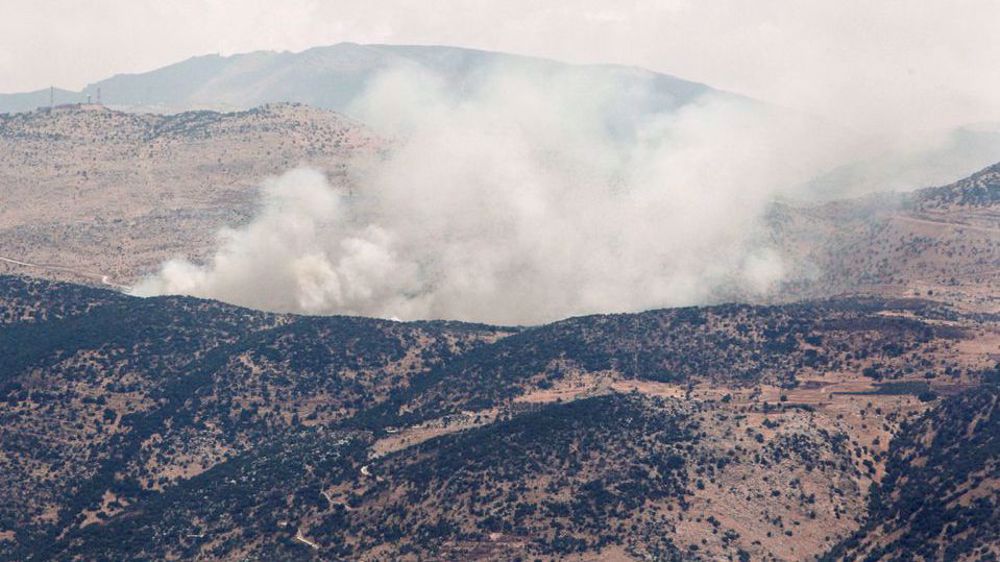Lebanon's caretaker Prime Minister Hassan Diab has urged the United Nations to exert pressure on the Tel Aviv regime to stop its repeated violations of the Arab nation’s sovereignty and territorial integrity, especially after the recent Israeli shelling and airstrikes on southern Lebanon.
Diab said Israel's attacks against Lebanon constitute a clear violation of the UN Security Council Resolution 1701, which ended the 33-day-long Israeli military onslaught on the country in the summer of 2006, Lebanon’s Arabic-language al-Mayadeen television news network reported.
He also called on the UN to force Israel into respecting the Resolution and stopping its frequent violations of the Lebanese sovereignty.
On Wednesday, explosions reportedly rang out across locations in southern Lebanon as a result of “extensive artillery attacks” launched by the Israeli military.
The Israeli Kan News channel said the attacks — which came after “three rockets” were reportedly fired from southern Lebanon towards the occupied territories — saw Israeli military forces firing “more than 100 artillery rounds” towards the country.
Israeli jets struck what its military claimed were rocket launch sites in Lebanon early on Thursday.
Lebanon to file complaint to UN Security Council
Lebanon is going to file a complaint to the United Nations Security Council with regard to the Israeli regime's attacks in southern Lebanon.
Diab asked Foreign Minister Zina Aker to “lodge an urgent complaint to the Security Council, regarding the Israeli aggression against Lebanon,” according to a government's statement.
The statement quoted Diab as saying “the Israeli enemy, with its artillery first and its warplanes second, carried out an explicit aggression against Lebanese sovereignty.”
He explained that “the enemy (Israel) publicly admitted this flagrant violation of Resolution 1701” with the pretext of “suspicious” rocket attacks “on northern occupied Palestine from the Lebanese territories, and no (Lebanese) party claimed responsibility for them.”
“This new and dangerous aggression constitutes a major threat to calm on Lebanon's southern borders, after a series of Israeli violations of Lebanese sovereignty and the use of Lebanese airspace to attack Syria,” Diab also said.
Iraqi resistance groups ready to support Hezbollah
Iraqi anti-terror Kata'ib Hezbollah and al-Nujaba resistance groups, which are part of Hashd al-Sha’abi, reaffirmed their support for Hezbollah, and declared their readiness to stand by it in any case of a possible confrontation with the occupying Israeli regime.
Kata'ib Hezbollah congratulated the Lebanese resistance movement on its “firm response to the recent Zionist regime’s attacks, as well as its violation of international resolutions and Lebanese sovereignty by targeting areas in the southern part of the country.”
Hezbollah has proven that it is “fully prepared to confront any adventurism that the Zionist enemy might get involved in,” it said, praising “the steadfastness of Lebanese nation in the face of attempts by the Zionist-US-Saudi coalition to drag Lebanon into malicious chaos and vanquish resistance forces.”
Kata'ib Hezbollah also called on Muslim nations, Iraqis and Syrians in particular, to return the favor to the Lebanese people “who sacrificed their precious lives to defend the security and sanctities of Muslim countries, and to confront the Takfiri gangs backed by the axis of evil.”
The Nujaba movement, for its part, declared its full readiness to “enter into the deterrence equation” announced by Hezbollah Secretary-General Sayyed Hassan Nasrallah.
“Hezbollah's calculated response proves that the occupying regime’s policies and aggressions will come to an end,” it said in a statement.
The movement said its “resistance fighters have their finger on the trigger and ready to respond. They are present in every field.”
‘Hezbollah prepared to respond befittingly’
A senior Hezbollah official said any Israeli act of aggression against Lebanon will be met with a strong response from the resistance movement.
“Hezbollah has publicly committed itself to the principle that any attack on the Lebanese territory would draw an appropriate response,” Hezbollah Deputy Secretary General Sheikh Naim Qassem said on Friday.
“Israel must understand that Lebanon is not an open arena for settling accounts and testing its capabilities,” he noted.
Sheikh Qassem described Lebanon as a protected area, saying, “Israel must remain deterred; otherwise we are ready to respond.”
He noted that “the whole world witnessed” Hezbollah’s response to Israel’s aggression, saying, “We cannot remain silent about it."
Sheikh Qassem also underlined Hezbollah’s constant preparedness to face any act of aggression by the Israeli regime.
Hezbollah announced in a statement that its units hit “open fields” near Israeli positions at 11:15 a.m. local time (0815 GMT) on Friday, using “dozens” of 122mm caliber rockets.
Al-Mayadeen television network said at least 20 rockets were fired at Israel's military positions. Al-Manar TV said a number of the rockets targeted the Douf military base.
Berri: Israel only understands language of resistance
Lebanese Parliament Speaker Nabih Berri hailed Hezbollah’s retaliatory rocket attacks.
“What happened today and yesterday confirms that the enemy (Israel) only understands the language of resistance and unity,” he said in a statement.
Berri stressed that “the obvious position and swift national response to what happened and is unfolding must be that the state officials take a sincere patriotic measure away from personal interests and hateful sectarian quotas, and shut the door on vacuum in state institutions.”
He noted that the Israeli regime would launch further acts of aggression against Lebanon and its southern parts in case the current political crisis in the Arab country persists.
Israeli media: Tel Aviv doesn't want war
Israeli newspaper Haaretz reported that people in the occupied territories, just like leaders of the regime, do not want a war.
“Israeli prime minister Naftali Bennett had previously said that Hezbollah rocket fire was a pretext for war. We do not want to start a war, but we should not bury our heads in the sand,” an unnamed political expert told Israel's Channel 12 television channel.
Israeli media outlets had previously said intelligence assessments in the army indicated that Hezbollah would not respond to Israeli airstrikes.
The assessments, however, turned out to be wrong and Hezbollah's rocket retaliation stunned Israeli leaders, according to political observers.
Source: Press TV



























